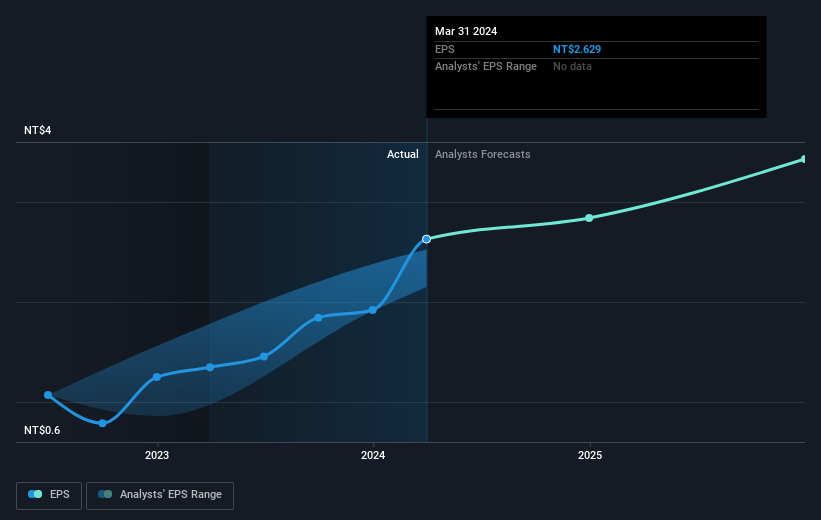- Taiwan
- /
- Electronic Equipment and Components
- /
- TWSE:2355
Earnings grew faster than the favorable 9.2% CAGR delivered to Chin-Poon Industrial (TWSE:2355) shareholders over the last five years

Chin-Poon Industrial Co., Ltd. (TWSE:2355) shareholders might be concerned after seeing the share price drop 18% in the last month. But the silver lining is the stock is up over five years. Unfortunately its return of 37% is below the market return of 142%.
While the stock has fallen 12% this week, it's worth focusing on the longer term and seeing if the stocks historical returns have been driven by the underlying fundamentals.
Check out our latest analysis for Chin-Poon Industrial
In his essay The Superinvestors of Graham-and-Doddsville Warren Buffett described how share prices do not always rationally reflect the value of a business. By comparing earnings per share (EPS) and share price changes over time, we can get a feel for how investor attitudes to a company have morphed over time.
During the last half decade, Chin-Poon Industrial became profitable. That would generally be considered a positive, so we'd hope to see the share price to rise.
The image below shows how EPS has tracked over time (if you click on the image you can see greater detail).

It is of course excellent to see how Chin-Poon Industrial has grown profits over the years, but the future is more important for shareholders. Take a more thorough look at Chin-Poon Industrial's financial health with this free report on its balance sheet.
What About Dividends?
As well as measuring the share price return, investors should also consider the total shareholder return (TSR). Whereas the share price return only reflects the change in the share price, the TSR includes the value of dividends (assuming they were reinvested) and the benefit of any discounted capital raising or spin-off. It's fair to say that the TSR gives a more complete picture for stocks that pay a dividend. In the case of Chin-Poon Industrial, it has a TSR of 55% for the last 5 years. That exceeds its share price return that we previously mentioned. The dividends paid by the company have thusly boosted the total shareholder return.
A Different Perspective
Chin-Poon Industrial provided a TSR of 29% over the year (including dividends). That's fairly close to the broader market return. That gain looks pretty satisfying, and it is even better than the five-year TSR of 9% per year. It is possible that management foresight will bring growth well into the future, even if the share price slows down. I find it very interesting to look at share price over the long term as a proxy for business performance. But to truly gain insight, we need to consider other information, too. For example, we've discovered 1 warning sign for Chin-Poon Industrial that you should be aware of before investing here.
For those who like to find winning investments this free list of undervalued companies with recent insider purchasing, could be just the ticket.
Please note, the market returns quoted in this article reflect the market weighted average returns of stocks that currently trade on Taiwanese exchanges.
New: AI Stock Screener & Alerts
Our new AI Stock Screener scans the market every day to uncover opportunities.
• Dividend Powerhouses (3%+ Yield)
• Undervalued Small Caps with Insider Buying
• High growth Tech and AI Companies
Or build your own from over 50 metrics.
Have feedback on this article? Concerned about the content? Get in touch with us directly. Alternatively, email editorial-team (at) simplywallst.com.
This article by Simply Wall St is general in nature. We provide commentary based on historical data and analyst forecasts only using an unbiased methodology and our articles are not intended to be financial advice. It does not constitute a recommendation to buy or sell any stock, and does not take account of your objectives, or your financial situation. We aim to bring you long-term focused analysis driven by fundamental data. Note that our analysis may not factor in the latest price-sensitive company announcements or qualitative material. Simply Wall St has no position in any stocks mentioned.
About TWSE:2355
Chin-Poon Industrial
Engages in the manufacturing, processing, and selling of printed circuit boards (PCBs) and electronic materials in Taiwan, the United States, Germany, Japan, Hungary, Romania, China, and internationally.
Flawless balance sheet with solid track record.


